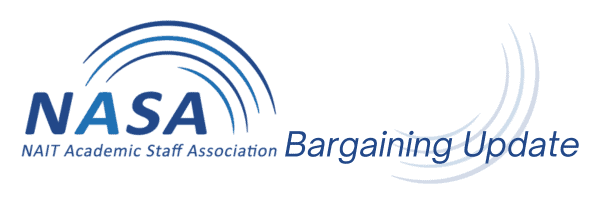
This update is on the state of bargaining to date as we head into informal mediation April 28 – 30. Additional dates are scheduled (if necessary) for May 27, June 2, 3, and 4th.
Some progress has been made discussing the lower or no cost proposals, and you can see what was “signed off” or agreed to by NAIT and NASA in this document 2025-04-24 Signed off and withdrawn proposals. This also lists the unopened Articles in the agreement that neither NAIT or NASA have made any proposals on. As of this writing there are 22 out of 56 Articles that are either signed off or unopened.
Counter proposals on 16 other Articles have been exchanged, which has in cases meant multiple counter-proposals on the same Article going back and forth. You will also see 7 counter-proposals as simple rejection of the other party’s ingoing proposal. The Counter proposals can be viewed here 2025-04-24 Counter proposal document.
With NAIT refusing to table their wage proposal until April 4, that meant many proposals in areas of workload, benefits, and job security that can have a monetary impact were avoided up until now. All other ingoing proposals remain on the table.
This is then the starting point for mediation. If a tentative agreement can be reached or recommended, NASA members will get to vote on that offer, and 50% of the members who turn out to vote have to vote yes for it to become your next agreement.
Proposals discussed through mediation are often “without prejudice” meaning neither party is making a binding commitment as they have informal discussions to try to reach a deal. That means if no deal can be reached through mediation including a majority no vote of NASA members, bargaining can then revert to the pre-mediation status quo.
NASA is at the same time working to secure an Essential Services Agreement. In the event that no agreement is reached through informal mediation, this would allow formal mediation to take place and move negotiations closer to the pressure point of being able to take a strike vote (at a strategic time). Seeing NAIT table a 10% offer instead of the even lower 7.5% offer some faculty have received should be seen as a sign that your resolve and pressure to date is having a positive effect in negotiations. More pressure will be required to get an agreement that you deserve with a good wage offer, no concessions, and improvements to workload, job security, and more.
The poll question in the last update asked if you would accept an agreement with a wage offer that did not include retro-pay for the 2024 raise. NASA members overwhelmingly responded no, that would not be acceptable.
We then know through recent polls that NASA members are looking for a deal that at least includes retro pay, and no concessions.
Today’s poll question is about job security.
NASA’s ingoing proposal to protect permanent work through delivery and staffing ratios remains, which would have 90% of SIHs delivered through continuing instructors, and 10% through non-continuing, as well as the headcount of non-Instructor NASA members to be 90% continuing, and 10% non-continuing.
The current collective agreement only requires 67% SIH delivery and non-Instructor headcount to be continuing staff. Recent reports NASA has been provided show NAIT has been operating in recent semesters with higher than 80% and sometimes 85% for SIH delivery. This means that if the current language is not improved, NAIT could reduce the SIH delivery by continuing instructors by over 13%, whether by removing continuing positions or hiring more non-continuing staff.
The bargaining committee has identified this as an important proposal.
The question asked in the email to NASA members was “Should the proportion of continuing staff SIH delivery and non-Instructor head count be improved in any offer NASA would accept?”
Remember that many NASA members will not read these updates, especially new, temporary, and casual staff. Your conversations with them can help shape success at the bargaining table.
In solidarity,
Trevor Zimmerman